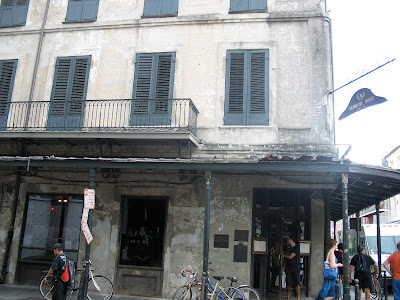No, we didn't go to Mardi Gras, but "Mardi Gras" means "fat Tuesday", and that about describes our day in New Orleans!
New Orleans was captured quickly by the Yankees in the Civil War, which fortunately spared it the fate of Atlanta and allowed the city to maintain its unique pre-war character. Atlanta, where we are headed next, has little left of its antebellum past. More on that later.
We arrived just in time to watch this paddle-boat take off. It's called the Natchez, which reminds me of a poem. It's totally not pc, and downright offensive, but I've always rather liked it as a sort of Mississippi River version of "Just So Stories." The First Banjo
We didn't actually get to hear the famous Preservation Hall Jazz Band, but we did see an exhibit on the band at the Old US Mint.
Andrew Jackson in Jackson Square.
These are pictures from the windows of the fascinating pharmacy museum, which was unfortunately closed. But just looking in the windows made me feel like I was in Diagon Alley.
Claire picked us a fantastic place for lunch. The Napoleon House cafe is housed in a building from the late 1700s. Everything on the menu was under $10 and the place just oozed atmosphere!
We sampled local cuisine: Gumbo, muffaletta sandwiches, jambalaya, and a charcuterie plate.
I can't believe the kids have never tried rock candy, so we bought some.
Henry Clay, Sr. (April 12, 1777 – June 29, 1852) was a lawyer, politician and skilled orator who represented Kentucky in both the Senate and in the House of Representatives. He served three different terms as Speaker of the United States House of Representatives and was also Secretary of State from 1825 to 1829. He lost his campaigns for president in 1824, 1832 and 1844.
Clay was a dominant figure in both the First and Second Party systems. As a leading war hawk in 1812, he favored war with Britain and played a significant role in leading the nation to war in the War of 1812.[2] In 1824 he ran for president and lost, but threw his electoral votes to John Quincy Adams, who made him secretary of state as the Jacksonians denounced what they considered a "corrupt bargain." He ran and lost again in 1832 and 1844 as the candidate of the Whig Party, which he founded and usually dominated. Clay was the foremost proponent of the American System, fighting for an increase in tariffs to foster industry in the United States, the use of federal funding to build and maintain infrastructure, and a strong national bank. He opposed the annexation of Texas, fearing it would inject the slavery issue into politics. Clay also opposed the Mexican-American War and the "Manifest Destiny" policy of Democrats, which cost him votes in the close 1844 election. Dubbed the "Great Pacificator," Clay brokered important compromises during the Nullification Crisis and on the slavery issue. As part of the "Great Triumvirate" or "Immortal Trio," along with his colleagues Daniel Webster and John C. Calhoun, he was instrumental in formulating the Missouri Compromise of 1820 and the Compromise of 1850. He was viewed as the primary representative of Western interests in this group, and was given the names "Henry of the West" and "The Western Star."[3] A plantation owner, Clay held slaves during his lifetime but freed them in his Will.[4]
Abraham Lincoln, the Whig leader in Illinois, was a great admirer of Clay, saying he was "my ideal of a great man." Lincoln wholeheartedly supported Clay's economic programs.[5] In 1957, a Senate Committee selected Clay as one of the five greatest U.S. Senators, along with Daniel Webster, John C. Calhoun, Robert La Follette, and Robert Taft.[6]
We really wanted to see the Confederate Museum in New Orleans, but arrived too late in the day.




























No comments:
Post a Comment